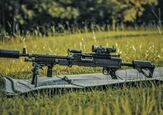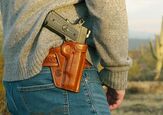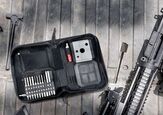The USGI Web Sling – More Than Just A Carrying Strap

The classic USGI web sling has been fielded on rifles since World War 2. It has seen action on the M-1 Garand, M-14, and M-16 rifles, and it provides both a method to carry a rifle and a loop sling for precision marksmanship use. Let’s take a closer look at this sling and its hidden talents.
More Slings @ TFB:
The web sling is an interesting piece of gear because it is both simple and capable. It consists of a simple strap with a clip and D-ring on the back end, and a small clamp adjuster at the front. This is not a complex unit like an M1907 sling. However, if it is installed incorrectly, it loses some capability.
The demo sling used herein is of unknown origin. It was included on my Armi Jager AP-15, and it shows the signs of many years of use. Various versions of this sling are still sold. Many are unbranded options found in bins at gun shows. Others, like the AmmoGarand or Tech Sights models, have devoted fans. I have not used either of those particular slings but they regularly show up in discussions of the USGI web sling.
Installing the USGI Web Sling
Step 1: Lay out the sling as shown, and thread through the front sling loop
The clamp lever should face the handguard. At the rear, the D-ring faces away from the rifle, with the clip hook opening facing up. The sling should feed easily through the clamp when the lever is opened.
Step 2: Attach the rear sling clip
And just like that, the sling is installed! It is very easy to put a web sling on a rifle.
Step 3: Adjust the length
The user can adjust the length of the sling at either end. Adjustments made at the D-ring will not be changed when the sling is set up for shooting use. It is also worth thinking about the placement of the clamp when the rifle is slung muzzle up. It can dig into the shoulder when carrying a heavy rifle.
Using the Web Sling
Should an opportunity arise, the USGI web sling can be used as a shooting sling. It is actually very capable in this application despite its simple construction.
Step 1: Unhook the rear sling clip
The spring steel rear clip is designed to pop off of the rear sling loop for loop sling use. An improperly-installed sling with this clip at the front would not be usable as a shooting sling.
Step 2: Create a loop sling by pulling the webbing out through the D-ring
The only mildly-tricky part of this process is knowing where the loop should be made. It comes from the D-ring. It is not pulled from between the D-ring and the clip, it comes directly out of the D-ring. Note that the rear clip sits outside the loop.
Step 3: Place on the support arm
First, twist the sling one-half twist outboard (to the left for a right-handed shooter, to the right for a left-handed shooter). Slide the support arm through the loop, placing it above the bicep. The positioning above the bicep helps keep the loop from sliding down the arm. The support arm reaches back over the sling, with the support hand placed between the sling and the handguard. Once in the shooting position, the sling will generally be tight across the back of the support hand and around the support arm.
Note that the rear clip is away from the arm. A properly-formed loop from the D-ring positions the rear clip outside the sling’s loop. The D-ring acts as a tensioner which helps keep the loop closed around the arm.
Step 4: Adjust the length with the clamp
One major advantage of the USGI web sling over the M1907 is the ease of adjustment. If the sling is too tight or too loose in a given position, simply open the clamp and add or remove slack. This can be accomplished without taking the sling off of the shooter’s arm. That is a huge advantage and it saves both time and consternation when trying to build a position. Shooters can mark the sling with a permanent marker once they find a setting that works for a given position.
Conclusion
The USGI web sling is a great choice for classic infantry rifles, and it brings a “clone correct” flavor to a service rifle along with some extra capability. And best of all, they are still pretty cheap. If you are interested in military rifles, you may already have one of these slings in your safe. Hopefully, it is now installed correctly and its use as a shooting sling makes some sense. If you don’t already have one, it is well worth checking one out.

AKA @fromtheguncounter on Instagram. Gun nerd, reloader, attorney, and mediocre hunter. Daniel can still be found on occasion behind the counter at a local gun store. When he is not shooting, he enjoys hiking, camping, and rappelling around Utah.
More by Daniel Y


















![[NRAAM 2024] The NEW Anderson Frontline Series AR15s](https://cdn-fastly.thefirearmblog.com/media/2024/06/04/0643117/nraam-2024-the-new-anderson-frontline-series-ar15s.jpg?size=350x220)














Comments
Join the conversation
Isn't that going to impact your POI on a non-free floated rifle?
I prefer the clamp facing away from the handguard. It doesn't dig into the back of my hand if the clamp ends up that far forward, it won't dig into a shoulder if I use the sling for carrying, and most importantly the free end of the webbing is easy for my trigger hand to grab for adjustments.
If you wonder whether your sling is tight enough, it's not. Townsend Whelen recommended about 75 pounds of tension between the arm loop and the back of the support hand. I haven't attained that standard in standing, kneeling, or seated positions, but in prone it yields a rigid, strong triangle for steady support.